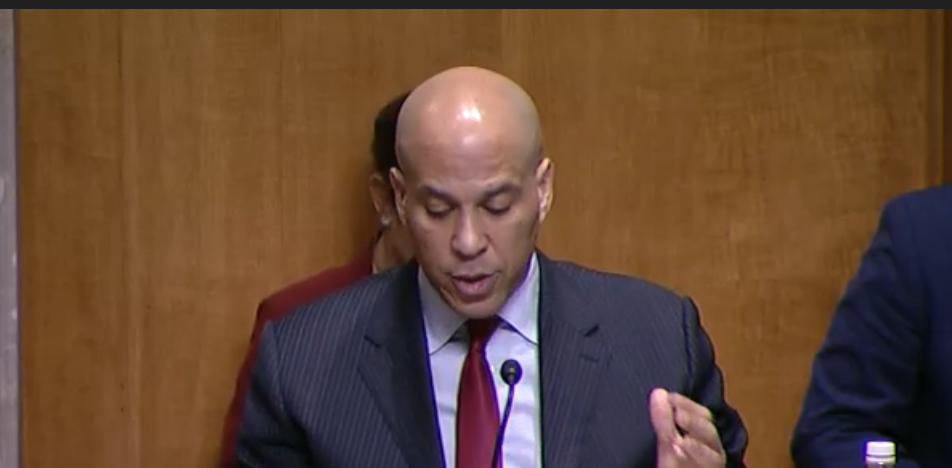Booker, Colleagues Urge Congressional Leadership for Increased Funding to Protect Those Facing Food Insecurity

Booker, Colleagues Urge Congressional Leadership for Increased Funding to Protect Those Facing Food Insecurity
Supplemental Nutrition Assistance Program will serve a critical role in supporting an increased number of Americans during health crisis
WASHINGTON, DC – Today, U.S. Senator Cory Booker (D-NJ) led members of New Jersey’s Congressional Delegation in urging Congressional leadership to incorporate provisions in future COVID-19 legislation that will bolster the Supplemental Nutrition Assistance Program (SNAP) and protect those facing food insecurity as a result of the coronavirus pandemic. SNAP is the largest federal nutrition assistance program and will serve a critical role in supporting an increased number of Americans during this health crisis.
“These unprecedented circumstances are straining the nation’s food banks and many Americans have turned to government benefits such as SNAP to put food on the table for their families,” the lawmakers wrote in a letter to Congressional leadership. “In 2019, over 700,000 New Jerseyans, including children, seniors, and individuals with disabilities, relied on SNAP. With this ongoing crisis, that number will only continue to increase, as a record 577,000 New Jerseyans filed for unemployment benefits in the last three weeks.”
Specifically, the lawmakers are calling for provisions that would increase the overall monthly benefit by 15 percent, increase the monthly minimum SNAP allotment from $16 to $30, place a hold on harmful rules proposed by the Executive Branch that weaken SNAP eligibility and benefits, and eliminate access barriers for SNAP participants.
In addition to Senator Booker, the letter was signed by U.S. Senator Bob Menendez (D-NJ) and U.S. Representatives Donald Norcross (NJ-01), Andy Kim (NJ-03), Josh Gottheimer (NJ-05), Tom Malinowski (NJ-07), Albio Sires (NJ-08), Bill Pascrell, Jr. (NJ-09), Donald M. Payne, Jr. (NJ-10), Mikie Sherrill (NJ-11), and Bonnie Watson Coleman (NJ-12).
The full text of the letter can be found here and below.
April 16, 2020
The Honorable Mitch McConnell The Honorable Charles Schumer
Majority Leader Minority Leader
United States Senate United States Senate
S-230, U.S. Capitol S-220, U.S. Capitol
Washington, D.C. 20510 Washington, D.C. 20510
The Honorable Nancy Pelosi The Honorable Kevin McCarthy
Speaker of the House Minority Leader
United States House of Representatives United States House of Representatives
H-232, U.S. Capitol H-204, U.S. Capitol
Washington, D.C. 20515 Washington, D.C. 20515
Dear Majority Leader McConnell, Minority Leader Schumer, Speaker Pelosi, and Minority Leader McCarthy:
As you consider additional legislative priorities addressing the COVID-19 pandemic, we urge you to incorporate provisions that will bolster the Supplemental Nutrition Assistance Program (SNAP) and protect those facing food insecurity. SNAP is a critical federal anti-poverty program that ensures our most vulnerable families receive nutrition assistance, and it will play a vital role in supporting an increased number of Americans during this health crisis. As such, we urge you to include provisions that will: (1) increase the overall monthly benefit by 15 percent; (2) increase the monthly minimum SNAP allotment from $16 to $30; (3) place a hold on harmful rules proposed by the Executive Branch that weaken SNAP eligibility and benefits; and (4) eliminating access barriers for SNAP participants.
The COVID-19 virus has been classified as a pandemic, and as such, many states have issued orders to “shelter in place”. As a result, businesses have closed, and many Americans have found themselves temporarily unemployed and struggling to afford basic necessities. These unprecedented circumstances are straining the nation’s food banks and many Americans have turned to government benefits such as SNAP to put food on the table for their families. In 2019, over 700,000 New Jerseyans, including children, seniors, and individuals with disabilities, relied on SNAP. With this ongoing crisis, that number will only continue to increase, as a record 577,000 New Jerseyans filed for unemployment benefits in the last three weeks.
The $1.40 per person per meal that SNAP provides for food is not enough, but it has been proven to assist families in need. At the height of the Great Recession in 2009, Congress passed the American Recovery and Reinvestment Act which helped prevent large increases in poverty by increasing the maximum SNAP benefit by 13.6 percent, totaling to $1.74 per person per meal. As we face this current crisis, it is imperative that Congress take similar steps by both increasing the monthly benefit by at least 15 percent and increasing the monthly minimum allotment from $16 to $30. Moreover, eliminating access barriers by allowing supermarkets to process SNAP transactions over the phone would also go a long way in keeping our most vulnerable populations safe while putting food on the table.
Finally, Congress must also put a stop to harmful rules from the Executive Branch that will weaken SNAP eligibility and benefits during the COVID-19 pandemic. In July 2019, October 2019, and December 2019 respectively, the Trump Administration published three rules that if enacted, will: (1) severely limit broad-based categorical eligibility (BBCE) and effectively throw hundreds of thousands of children off of school meal participation; (2) strip states of their much needed flexibility to set their own Standard Utility Allowance (SUA) using state-based and current energy cost information; and (3) eliminate state flexibility to waive certain work requirements and exemptions for SNAP participants who are able-bodied adults without dependents (ABAWDs), revoking SNAP benefits from an estimated 12,000 living in New Jersey. The BBCE and ABAWDs rules circumvent congressional intent as laid-out in the 2018 Farm Bill and short of rescinding them, all three rules should be stayed as we continue to fight the spread of the COVID-19 virus.
We thank you for your consideration and close attention to these priorities to support those in New Jersey and across the country during this crisis.
Sincerely,







